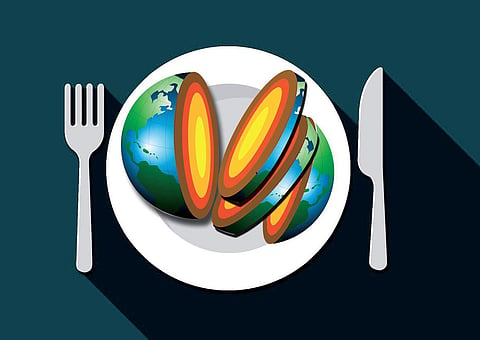

When lightning lockdowns were imposed in this country taking many unawares, an unorthodox restaurant in Goa fed its staff and supported neighbours from what they grew in the local farm, improvising for themselves with things like spinach stem and sweet potato leaves that provided essential nutrition in those darkest days of an ongoing disaster. The eatery in question, Edible Archives, is just one of many experiments by individuals and groups who care about the impact of food and agricultural systems on the planet and practise sustainable alternatives.
As the robust protests by our farmers against free-market oriented legislation continue, it is time to look at the production and consumption of food from a perspective which builds in sustainability, equity, justice and health. This will become increasingly difficult to ignore in the face of facts, pointed out by Michael A Clark and others, which show how agricultural food production is already responsible for about 30 percent of global greenhouse gas emissions among several other environmental ills.
A large part of the problem lies in industrial scale, high input agriculture and farming practices with associated transport and processing. Parallel to this are the stories of hunger and malnutrition. The industrial agricultural behemoth and high consumption is heating up the planet and if we have to have food sustainability in the near future through just and equitable means, we need to look for alternatives and new ideas. Kentaro Suzuki, who runs a small organic vegetables business delivering fresh produce from farmers to restaurants and households of Kyoto, tells me that ‘a vision of a public food system that stands for local and organic production and distribution, which leads to a small but resilient community-based economy, and hopefully, food sovereignty,’ is what keeps him inspired besides personal goals like making the world a better place for his kids.
All across the world, groups of conscientious ‘guerrilla gardeners’ are secretly planting vacant or neglected spaces in cities and towns with vegetables or flowers using techniques like seed bombing, producing an alternative source of food and aesthetics that is free from the market. Agroecology, permaculture, the sharing of folk varieties of seeds and numerous other environment-friendly means exist which can provide nutritious meals to large numbers of people while being more resilient to climate shocks and market dynamics. These practices also allow more control to communities over the food they grow and consume, bringing us to debates around food as commons and food as a human right that is raging in the world today. Food as commons is not a new concept and practices like sharing of seeds or access to fishing in international waters are all elements of ‘commoning’ where communities exert their economic autonomy from the state or the market.
Jose Luis Vivero Pol, a Programme Officer with the World Food Programme in Rome, suggests practices like cultivating part of our own food, meal swapping and sharing through apps, eating healthy, organic, local and striving for guaranteed universal food coverage for city, state or country as ways to promote food as a commons. The Mid-day Meal (MDM) scheme is definitely one example where such a guarantee of nutrition has been achieved for schoolchildren in this country. Greening of the MDM, a focus on organic and local in the food and prasad offered in religious establishments and ceremonies, the telling of stories about sustainable food alternatives could be powerful levers to usher in a culture that challenges environmentally harmful practices of producing and supplying food.
Between small communities of practice, experiments with sustainable food alternatives and revolutionary ideas like food as commons, which can drive the move towards a sustainable food future, there are many ways that the future can actually shape out. Steven McGreevy, an environmental sociologist at the Resource Institute for Humanities and Nature in Japan which recently organised a major food futures symposium, where I was a speaker, tells me that he hopes to see more merging islands of good practice in the realm of food and agriculture, leading to bigger changes rather than disaster-led adjustments.
‘A decentralised, distributed local food system model may require broad participation from many, not just full-time farmers,’ he adds. This calls for a new work-life balance and would be good in all senses because new studies show, food with more health benefits has a lower impact on the planet. Also, McGreevy reminds, time spent outdoors, with nature, boosts mental and physical well-being. About time to pick up spade and trowel?
Rajat Chaudhuri rajat@rajatchaudhuri.net
Writer and climate activist